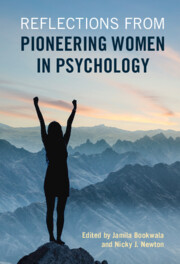Book contents
- Reflections from Pioneering Women in Psychology
- Reflections from Pioneering Women in Psychology
- Copyright page
- Contents
- Contributors
- Foreword
- Acknowledgments
- Introduction
- Chapter 1 Hardly a Straight Line
- Chapter 2 Challenging Paradigms
- Chapter 3 From Young and Naïve to Old and Experienced
- Chapter 4 Being the Change You Want to See in the World
- Chapter 5 Accidental Professor
- Chapter 6 Finding a Place and Changing the Space
- Chapter 7 The More You Do, the Better It Gets
- Chapter 8 Happily Ever After
- Chapter 9 Love and Work
- Chapter 10 Overcoming Obstacles and Thriving
- Chapter 11 Out of the Box
- Chapter 12 Stress Has Been Good to Me
- Chapter 13 On Pioneering at Northwestern University… With a “Village” of Supports
- Chapter 14 Against All Odds
- Chapter 15 Tricked by Memory
- Chapter 16 Doing Psychology in Unsettled Times
- Chapter 17 Overcoming Obstacles
- Chapter 18 Knocking on Doors that Opened for Me
- Chapter 19 Paths Unexpected, but Rewarding, during an Academic Journey
- Chapter 20 Reflections on an Improbable Journey
- Chapter 21 The Delicate Art of Balancing Serendipity and Planfulness in an Academic Career
- Chapter 22 A “Skin in the Game” Scaffolded Career Path
- Chapter 23 A Wonderful Journey Along an Unforeseen Path
- Chapter 24 Choosing Both
- Chapter 25 Identity and My Life Story in Psychology
- Chapter 26 Doing What Matters: A Framework for Academic Success
- Conclusion
- Index
- References
Chapter 25 - Identity and My Life Story in Psychology
Published online by Cambridge University Press: 09 April 2022
- Reflections from Pioneering Women in Psychology
- Reflections from Pioneering Women in Psychology
- Copyright page
- Contents
- Contributors
- Foreword
- Acknowledgments
- Introduction
- Chapter 1 Hardly a Straight Line
- Chapter 2 Challenging Paradigms
- Chapter 3 From Young and Naïve to Old and Experienced
- Chapter 4 Being the Change You Want to See in the World
- Chapter 5 Accidental Professor
- Chapter 6 Finding a Place and Changing the Space
- Chapter 7 The More You Do, the Better It Gets
- Chapter 8 Happily Ever After
- Chapter 9 Love and Work
- Chapter 10 Overcoming Obstacles and Thriving
- Chapter 11 Out of the Box
- Chapter 12 Stress Has Been Good to Me
- Chapter 13 On Pioneering at Northwestern University… With a “Village” of Supports
- Chapter 14 Against All Odds
- Chapter 15 Tricked by Memory
- Chapter 16 Doing Psychology in Unsettled Times
- Chapter 17 Overcoming Obstacles
- Chapter 18 Knocking on Doors that Opened for Me
- Chapter 19 Paths Unexpected, but Rewarding, during an Academic Journey
- Chapter 20 Reflections on an Improbable Journey
- Chapter 21 The Delicate Art of Balancing Serendipity and Planfulness in an Academic Career
- Chapter 22 A “Skin in the Game” Scaffolded Career Path
- Chapter 23 A Wonderful Journey Along an Unforeseen Path
- Chapter 24 Choosing Both
- Chapter 25 Identity and My Life Story in Psychology
- Chapter 26 Doing What Matters: A Framework for Academic Success
- Conclusion
- Index
- References
Summary
As someone who studies identity across the lifespan, the reflections on my life history have provided an interesting exercise in the life review process. From my research on psychosocial development to my career in teaching, I have explored in this chapter the primary themes that have organized my own involvement in the field. Many of the key events in my career resulted from fortuitous coincidences, including my collaborations with colleagues and students. I feel particularly grateful for the mentoring I received earlier in my career and which I have tried to pay forward with emerging psychologists. In addition to my professional identity, my identity with respect to family has also figured heavily in my life history, and I have incorporated into this chapter the ways in which my children (and now grandchildren) are important influences on who I am today.
- Type
- Chapter
- Information
- Reflections from Pioneering Women in Psychology , pp. 318 - 327Publisher: Cambridge University PressPrint publication year: 2022



